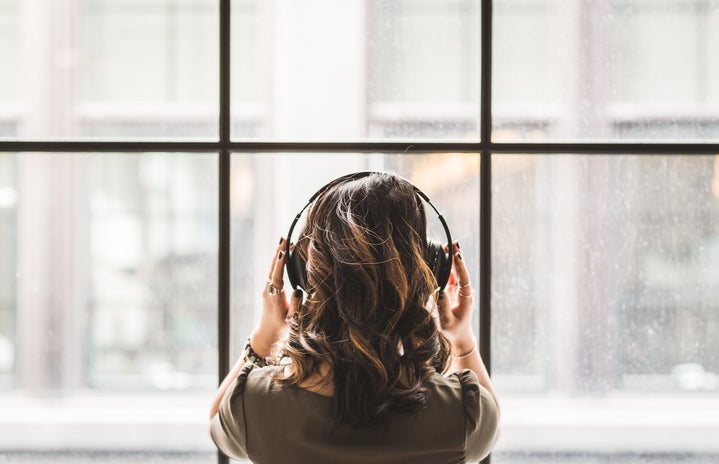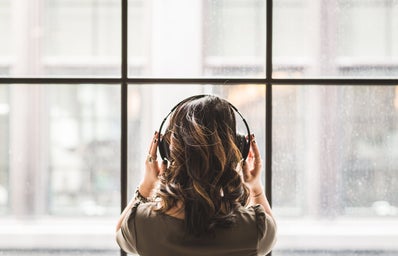It’s 2010. I’m ten years old and shamelessly jamming out to Taylor Swift’s album blaring from the dusty black CD player in the corner of my room.
But hold on; it’s actually 2019, I’m on the subway wearing headphones and “Love Story” just came on shuffle from my Spotify playlist. The only thing that hasn’t changed is that there are still no boys throwing rocks at my window.
Whenever I listen to the very first albums I ever bought, Fearless and Speak Now, I’m always brought back to my ten year old self dancing in her room. But long before I began seeking out music for myself and developing my own taste, the music I heard around me was starting to attach itself to memories.
My dad’s jazz albums take me back to Saturday night dinners. My family would sit at our dining table instead of the kitchen table, my parents would drink red wine and sometimes, my dad would let me or my brother choose the CD. It had to be from his collection, of course. He wouldn’t even settle for Adele. Now, if I hear just a few notes of an Etta James or Frank Sinatra song, it’s Saturday night and I’m back in my seat at the dining table, even though my family ended that tradition years ago.
Reading an old diary reminds me of how I felt at a certain time but music usually has a much stronger effect on me. Most often, the music attaches itself to a general time period but sometimes it’s really specific.
When I hear a song that I have a particular memory attached to, it really is like I’m transported back in time. It’s so easy to imagine a younger version of myself hearing the exact same thing and all of the emotions come flooding back.
I’ve been connecting music to memories for as long as I can remember. But it’s not just me. The ability for music to make people feel nostalgic is a widespread phenomenon and there’s actually some fascinating science behind it.
Last year, economist Seth Stephens-Davidowitz analyzed Spotify data to determine if adults have a preference for songs released during their youth. It turns out that in general, songs are most popular among the demographic that was going through puberty when the song was first released. For example, “Creep” by Radiohead is currently the most popular among 38-year-old men, who were approximately 14 when the song was first released.
A 2008 study may explain why. It found that memories we form in our early teenage years and into our twenties, a period of time dubbed the “reminiscence bump,” tend to be the ones we return to the most. So it makes sense that the songs we listened to during that time have strong emotions and memories attached to them.
Some streaming platforms have embraced this phenomenon with nostalgia-themed ads and playlists. A recent Spotify ad campaign plays on nostalgia with witty billboards and posters. The message seems to be that although time has passed and our lives have changed, the music we used to love back in the day remains the same.
I began to really think about the nostalgic effect music could have on me when Spotify had made me a personalized “Summer Rewind” playlist; a collection of the songs I had listened to most that summer.
The happy, sunny memories I attached to the songs on that playlist got me through the long dreary winter – and it kept me on Spotify. So keep that 2000s throwback playlist on repeat but beware of the fact that brands know how to capitalize off those warm fuzzy nostalgic feelings.
I have created my own memories with countless songs. The memories range from mundane to funny to embarrassing to painful to happy. “Ain’t it Fun” by Paramore makes me feel terrified to start high school again. “Hometown” by Twenty One Piilots reminds me of taking the bus to my co-op placement every day. “Human” by Cher Lloyd brings me back to a terrible time in my life when I just wanted out. And when I hear “Smash Into You” by Hey Violet, I can feel the warmth of a summer night and a strong craving for ice cream.
I realize these scenarios probably won’t make sense to anyone but me. The same songs can mean so many different things to different people and can have a wide spectrum of memories attached to them. That’s the beautiful thing about music and what makes me wish I had any musical talent. Math equations or scientific formulas or even news articles can pretty much be interpreted and used one way. They’re straightforward, black-and-white and impersonal. But music is simultaneously universal and personal.
10 different people across the world can sit alone in their room with headphones on, listening to the exact same song at the exact same time and it can prompt 10 completely different emotions, memories and thoughts. Isn’t that just amazing?
I like to think that I’ll be making and reliving music memories for the rest of my life. Even if in ten years I have a completely different music taste, from the first few beats of a Taylor Swift song, I’ll remember exactly what it was like to be a teenager.



